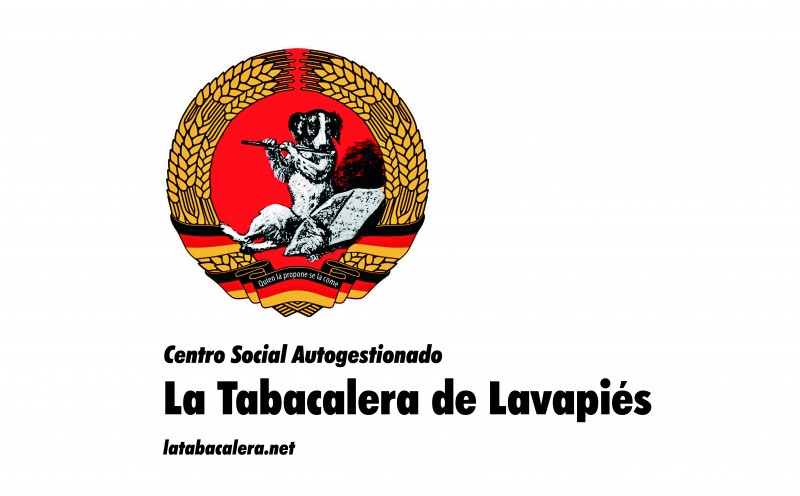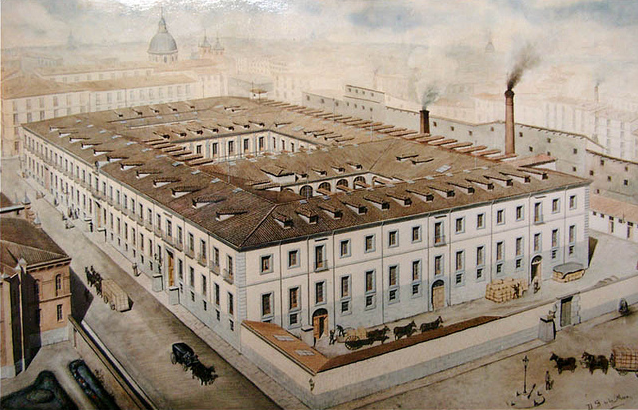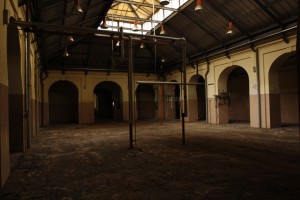ENGLISH
All texts by Tabacalera have a Creative Commonos 3.0 license.
You are free:
- to Share — to copy, distribute and transmit the work
- to Remix — to adapt the work
- to make commercial use of the work
Under the following conditions:
- Attribution —You must attribute the work in the manner specified by the author or licensor (but not in any way that suggests that they endorse you or your use of the work).
- Share Alike —If you alter, transform, or build upon this work, you may distribute the resulting work only under the same or similar license to this one.
From the Tobacco Factory to the Self Organized Social Center
The building of the former Tobacco Factory of Embajadores is in public ownership and under the Ministry of Culture through the General Directorate of Fine Arts (GDFA). Due to its characteristics, the building is part of the historical heritage and has been listed as Heritage of Cultural Interest.
The Tobacco Factory of Madrid was finally vacated in 2009, just after the privatization of La Tabacalera/Altadis. The building remained abandoned for ten years of progressive deterioration and no maintenance, ten years of struggles to open the building to a neighbourhood with a lack of public spaces.
By November 2007, the Cabinet approved an agreement in order to found the National Visual Arts Center (CNAV), whose headquarters were suposed to be held in the Tabacalera building. The July 29th, 2008 seven architecture consultants were invited via email to submit a proposal. In November 2009 the Minister of Culture, César Antonio Molina, presented to the media the project chosen toghether with the authors: Nieto and Sobejano. On 26th November, the Council of Architects rejected the award procedure. The February 25th, 2009 announced a new contest and finally the June 2, 2009 Nieto and Sobejano again were graced with the award of the project, this time with Ángeles González-Sinde as minister.

The project, with a total cost 30 million euros, is not carried out for lack of funds and proposes and the DGBA proposes to SCCPP cultural association to conduct an artistic and cultural project in the building. This association, which had participated in public discussions about the future of the building, extends the proposal to other groups and residents of the neighborhood of Lavapies and accepts the DGBA order, signing a one-year contract that commits to develop a self-managed project called Self Managed Social Center La Tabacalera, using 9200 meters of the 30,000 square available from the building.

Picture by La Tabacalera.
After two years in which the legal status depended on that contract and a renewal for another year, LTBC, articulated as a independent project, requested to DGBA the execution of a cession agreement that would give stability in the space and over time, to this experience of participation. This assignment took effect in January 2012, for a period of two years, renewable for two at a maximum of eight years.
The transfer was performed at the CSA La Tabacalera Cultural Association of Lavapies, an association created by the assembly of the social center and anyone can join, for the sole purpose of having a valid legal concept that could take over the assignment. In the statutes of the association is made explicit mention that does not interfere in the decision-making of the CSA, leaving this matter to the assembly and the committees that manage the center-all of them open to whoever wants to participate.
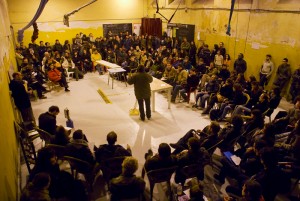 Picture by The Iban
Picture by The Iban
LTBC is a social center, promotes the direct participation of citizenship in managing the public domain. A cultural center that understands culture as a concept encompassing creative and social skills of citizenship. These capabilities include not only artistic production, but also social action, critical thinking and the dissemination of ideas, works and procedures that seek to expand and democratize the public sphere. LTBC is a comprehensive center that includes languages and modes of expression, but also the complexity of demographic, cultural, ethnic, records and ways of inhabiting the territory and the time in the short therm.
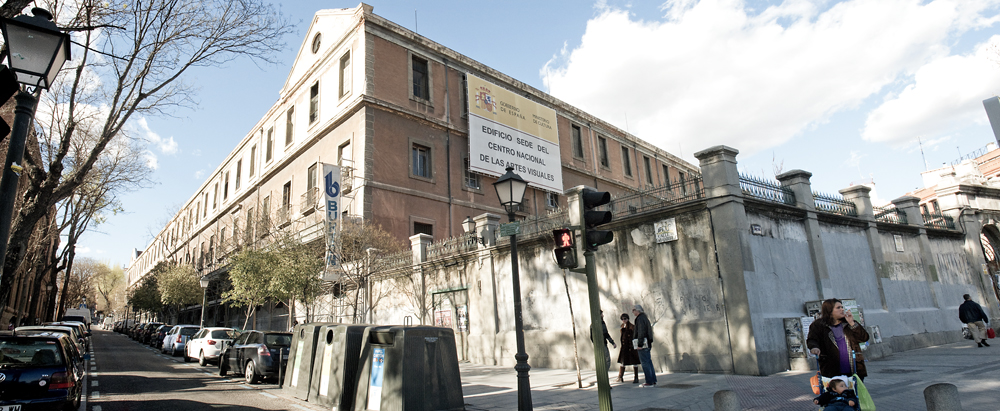
In this context, project of LTBC is a bet in a low shape that provides opportunities to meet and accept the responsibility to address its drawbacks. Since its inception, has been an open invitation to all kinds of groups and individuals to get involved and participate in the project. As a result, the internal social composition LTBC shows the complexity and richness of a life that supports the diversity of human beings and builds its own ecosystem betting on intercultural coexistence, inter-ethnic, gender and sexual exceptions and, ultimately, by heterogeneity.
[55 interviews at Tabacalera. Spanish without subtitles. Video by Tabacanal]
To enable this new model are required: (a) full autonomy for the organization and development of the initiative from those who integrates, (b) exploration of public management in terms of participatory democracy, (c) promoting cultural practices of low cost and free culture, (d) a programming methodology different from classical practices of cultural management, (e) the effort to level the different scales of social and cultural expression.
LTBC neither is and can not be the use of a few well-connected people or privileged. By their nature (not proprietary or appropriated, public, commons), can not even be the common resource of a permanent group. The condition is the opening to a new compositions, new events, at different levels of involvement, work, use. In LTBC are not only shown the initiatives that are placed stably in the building, but all those who need space and comply with the criteria that sustain it: free and open culture, cooperation, horizontality, transparency, non-profit or proprietary use, but collective, supportive and responsible resource … is precisely the features that make LTBC a unique experiment which make it a public reference and, therefore, not subject to the property of the parties that have driven the initiative.
IMPORTANT NOTICE: If you want to contact us, propose or ask something, the best way is to come to the center, the comments left on pages are, unfortunatelly, not always answered. Periodically, we perform a welcome workshop in which we tell you how the CSA rules and solve any doubts. Thank you and hope hearing from you soon!!
What do we do and how?
La Tabacalera is a self-organised social center, a space for theatre, music, dance, painting, conferences, meetings, audiovisuals workshops, events, neighborhood actions… We try and give all of these activities equal standing and to promote our ideal of collective, public, transformational interventions within them.
We consider transformational that which is created from self-organisation and autonomy and not from dependence.
Self-organization and autonomy, rather than dependence, create results
USING
- Self resources
- Aiming to generate cultural and social health.
- Horizontal organisation and cooperation
- Self criticism and transparency
- Direct participation
- Criticism and experimentation
WITHOUT
- Outside, conditioned financing
- Profit motive
- Leadership of individualism
- Self-complacency or concealment
- Delegation
- Conservatism
We try to organise usage of the space as to make all of the above possible and leaving enough margin for unpredictable events and vying for cooperation amongst all involved with the definition and development of our project.
We use common criteria, applicable to both the social center as a whole and to each activity, collective or space.
Horizontality all management spaces and activities are required to foster cooperation amongst equals, to search for democratic means of participation, organizations and decision making
Transparency decisions an actions must be communicated and be accessible to anyone, so they can be evaluated collectively.
Free of Charge access to spaces and activities must be free, money cannot be a filter or a selection mechanism. All of the social centers resources are appointed to all and for common, public and free use
Economic Sustainability in order to be sustainable, certain activities or projects necessitate the generation of their own economic resources. In select occasions and always under the assembly’s approval, certain activities are geared towards self-employment initiatives and serve to establish alternate systems of exchange, amongst which money may be involved as a return mechanism.
Co Responsibility, cooperation, compromise and proportionality: mutual support guides the management and maintenance of all activities and spaces y its within everyone’s responsibility to partake in the daily management and decision making affecting the social center and each of its spaces. A responsible attitude implies acting measuredly in regards to energy and labour and regard to our self-imposed limitations.
Respect: for people, for diversity, for collective decisions, for the agreed-on models of management within the spaces we use.
Autonomy: decisions and plans of action or organization of both the collective as a whole, and also within each of the spaces are taken without outside intervention or dependence on external agents and are based on respect for our common agreements and criteria.
Free Culture: all that’s produced or reproduced on LTBC must be made under free licenses, be freely available and have as an objective, the expansion of the public domain in regards to knowledge and culture.
Polyvalence, flexibility, non exclusivity and non-appropriation of the spaces: beyond the necessary adaptation of certain spaces for determined uses, these más be compatible with and accessible to all, as well as permeable to new proposals. Usage of a space may be revised and evaluated by the assembly within the time frames determined by the former. Projects, collectives or groups using a space agree to present an evaluation within the timeframes established by the assembly.
LBTC is a public open space: it’s owned by no one and it’s owned by everyone. All participants in the management of the center are responsible for establishing mechanisms to ensure the center is truly open and dynamically renewed with initiatives and persons able to make the space theirs in such a way that no person or project allocates itself undue influence.
LBTC is a living process, a collective learning experience: these criteria are tendencies we seek but do not always fully meet. We strive to rethink, assimilate and include new ones from day to day.
LTBC is does not tolerate sexim, racism, discrimination, homophobia and insolidarity. We have decalogue of good practises that we try to follow, it is up to each and everyone of us to comply with it.
How do we organize.
LTBC operates through open assemblies both in its general space and in the spaces, projects and areas specific to each activity. Any person or group which shares the common operating criteria, may participate in LTBC.
LTBC works through assemblies and commissions:
The assembly of the CSA is held every fifteen days, on Mondays at 20:30 at the No-Boss Room (Sala Sin jefe)
Once a month (normally the last sunday of each month) we organise a common working session to, for instance, fix toilets, paint certain areas, repair the electricity…
Every three months we held a plennary session, where the former period is evaluated and the guide lines for the next one are debated and decided.
The agenda for these assemblies is public and anyone can propose items to be included in it through the social centre mail lists or in the assembly itself. The contents of the agenda are communicated in the physical spaces created for the purpose and through the CSA mail lists. The acts are kept in our wiki and anyone from Tabacalera can reach them.
In each assembly we chose a rotative dinamization team that prepares the next meeting. If you are interested in proposing a topic, you should come on Monday at 19.30 t dicuss with the dinamizers how to deal with that specific point: also decide whether it is an informative topic, an agreement to be reached, the time it should take, talking turns, etc.
The working commisions are:
programming: where the internal CSA criteria concerning the different activities are applied, proposals are received and allocated, material and technical needs are noted and the activities calendar is decided.This comission meets on Wednesdays from 20:00 in the offices area.
economy: where monetary resources are managed, accounts are assessed, proposals for economic activities, expenses and investments are received and funding plans are drafted.This commission meets on Tuesdays at 19:00 at the Caja Central.
turns: where the turns for the maintainance of the centre are distributed among the colectives that are present in Tabacalera and where there is a follow up of the number of participants that are in charge of the common tasks. This commission meets on Tuesdays at 20:00 at the Sin Jefe room.
coexistence: where mediation efforts take place, potential conflicts are dealt with and it is ensured that the activity complies with the operation of the social centre. This commission meets when necessary.
communication: where communication within the social centre is planned, and dissemination mechanisms are organised and liaison with the media is taken care of. This commission meets on Wednesdays at the offices area.
maintenance and welfare: where improvement works and adaptation of the physical resources of the social centre are planned. This commission meets when required.
Some of this commisions are fully operative, others come and go, but all of them need people to collaborate. If you want to take part in any of them, you are welcome to pop in on Mondays.
FRANÇAIS
EUSKERA
Gizarte-zentro autogestionatua -> http://titanpad.com/NxkqXR6CPr
Nola antolatzen gara? -> http://titanpad.com/um7mTY1ELs

